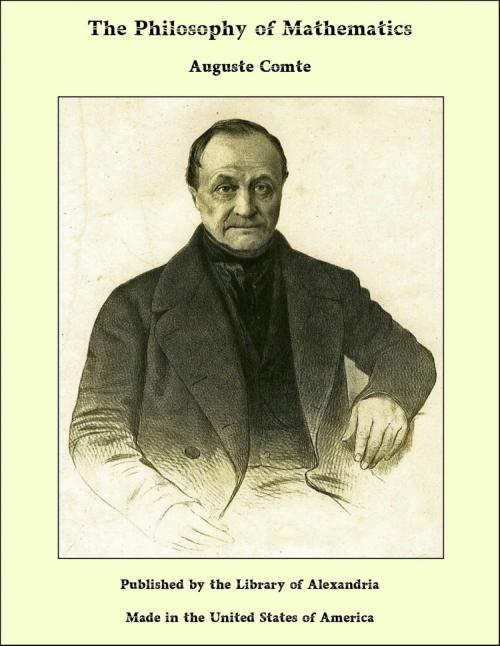The Philosophy of Mathematics
Nonfiction, Religion & Spirituality, New Age, History, Fiction & Literature| Author: | Auguste Comte | ISBN: | 9781465527660 |
| Publisher: | Library of Alexandria | Publication: | March 8, 2015 |
| Imprint: | Language: | English |
| Author: | Auguste Comte |
| ISBN: | 9781465527660 |
| Publisher: | Library of Alexandria |
| Publication: | March 8, 2015 |
| Imprint: | |
| Language: | English |
The pleasure and profit which the translator has received from the great work here presented, have induced him to lay it before his fellow-teachers and students of Mathematics in a more accessible form than that in which it has hitherto appeared. The want of a comprehensive map of the wide region of mathematical science—a bird's-eye view of its leading features, and of the true bearings and relations of all its parts—is felt by every thoughtful student. He is like the visitor to a great city, who gets no just idea of its extent and situation till he has seen it from some commanding eminence. To have a panoramic view of the whole district—presenting at one glance all the parts in due co-ordination, and the darkest nooks clearly shown—is invaluable to either traveller or student. It is this which has been most perfectly accomplished for mathematical science by the author whose work is here presented. Clearness and depth, comprehensiveness and precision, have never, perhaps, been so remarkably united as in Auguste Comte. He views his subject from an elevation which gives to each part of the complex whole its true position and value, while his telescopic glance loses none of the needful details, and not only itself pierces to the heart of the matter, but converts its opaqueness into such transparent crystal, that Other eyes are enabled to see as deeply into it as his own. Any mathematician who peruses this volume will need no Other justification of the high opinion here expressed; but Others may appreciate the following endorsements of well-known authorities. Mill, in his "Logic," calls the work of M. Comte "by far the greatest yet produced on the Philosophy of the sciences;" and adds, "of this admirable work, one of the most admirable portions is that in which he may truly be said to have created the Philosophy of the higher Mathematics:" Morell, in his "Speculative Philosophy of Europe," says, "The classification given of the sciences at large, and their regular order of development, is unquestionably a master-piece of scientific thinking, as simple as it is comprehensive;" and Lewes, in his "Biographical History of Philosophy," names Comte "the Bacon of the nineteenth century," and says, "I unhesitatingly record my conviction that this is the greatest work of our age." The complete work of M. Comte—his "Cours de Philosophie Positive"—fills six large octavo volumes, of six or seven hundred pages each, two thirds of the first volume comprising the purely mathematical portion. The great bulk of the "Course" is the probable cause of the fewness of those to whom even this section of it is known. Its presentation in its present form is therefore felt by the translator to be a most useful contribution to mathematical progress in this country. The comprehensiveness of the style of the author—grasping all possible forms of an idea in one Briarean sentence, armed at all points against leaving any opening for mistake or forgetfulness—occasionally verges upon cumbersomeness and formality. The translator has, therefore, sometimes taken the liberty of breaking up or condensing a long sentence, and omitting a few passages not absolutely necessary, or referring to the peculiar "Positive philosophy" of the author; but he has generally aimed at a conscientious fidelity to the original. It has often been difficult to retain its fine shades and subtile distinctions of meaning, and, at the same time, replace the peculiarly appropriate French idioms by corresponding English ones. The attempt, however, has always been made, though, when the best course has been at all doubtful, the language of the original has been followed as closely as possible, and, when necessary, smoothness and grace have been unhesitatingly sacrificed to the higher attributes of clearness and precision
The pleasure and profit which the translator has received from the great work here presented, have induced him to lay it before his fellow-teachers and students of Mathematics in a more accessible form than that in which it has hitherto appeared. The want of a comprehensive map of the wide region of mathematical science—a bird's-eye view of its leading features, and of the true bearings and relations of all its parts—is felt by every thoughtful student. He is like the visitor to a great city, who gets no just idea of its extent and situation till he has seen it from some commanding eminence. To have a panoramic view of the whole district—presenting at one glance all the parts in due co-ordination, and the darkest nooks clearly shown—is invaluable to either traveller or student. It is this which has been most perfectly accomplished for mathematical science by the author whose work is here presented. Clearness and depth, comprehensiveness and precision, have never, perhaps, been so remarkably united as in Auguste Comte. He views his subject from an elevation which gives to each part of the complex whole its true position and value, while his telescopic glance loses none of the needful details, and not only itself pierces to the heart of the matter, but converts its opaqueness into such transparent crystal, that Other eyes are enabled to see as deeply into it as his own. Any mathematician who peruses this volume will need no Other justification of the high opinion here expressed; but Others may appreciate the following endorsements of well-known authorities. Mill, in his "Logic," calls the work of M. Comte "by far the greatest yet produced on the Philosophy of the sciences;" and adds, "of this admirable work, one of the most admirable portions is that in which he may truly be said to have created the Philosophy of the higher Mathematics:" Morell, in his "Speculative Philosophy of Europe," says, "The classification given of the sciences at large, and their regular order of development, is unquestionably a master-piece of scientific thinking, as simple as it is comprehensive;" and Lewes, in his "Biographical History of Philosophy," names Comte "the Bacon of the nineteenth century," and says, "I unhesitatingly record my conviction that this is the greatest work of our age." The complete work of M. Comte—his "Cours de Philosophie Positive"—fills six large octavo volumes, of six or seven hundred pages each, two thirds of the first volume comprising the purely mathematical portion. The great bulk of the "Course" is the probable cause of the fewness of those to whom even this section of it is known. Its presentation in its present form is therefore felt by the translator to be a most useful contribution to mathematical progress in this country. The comprehensiveness of the style of the author—grasping all possible forms of an idea in one Briarean sentence, armed at all points against leaving any opening for mistake or forgetfulness—occasionally verges upon cumbersomeness and formality. The translator has, therefore, sometimes taken the liberty of breaking up or condensing a long sentence, and omitting a few passages not absolutely necessary, or referring to the peculiar "Positive philosophy" of the author; but he has generally aimed at a conscientious fidelity to the original. It has often been difficult to retain its fine shades and subtile distinctions of meaning, and, at the same time, replace the peculiarly appropriate French idioms by corresponding English ones. The attempt, however, has always been made, though, when the best course has been at all doubtful, the language of the original has been followed as closely as possible, and, when necessary, smoothness and grace have been unhesitatingly sacrificed to the higher attributes of clearness and precision















